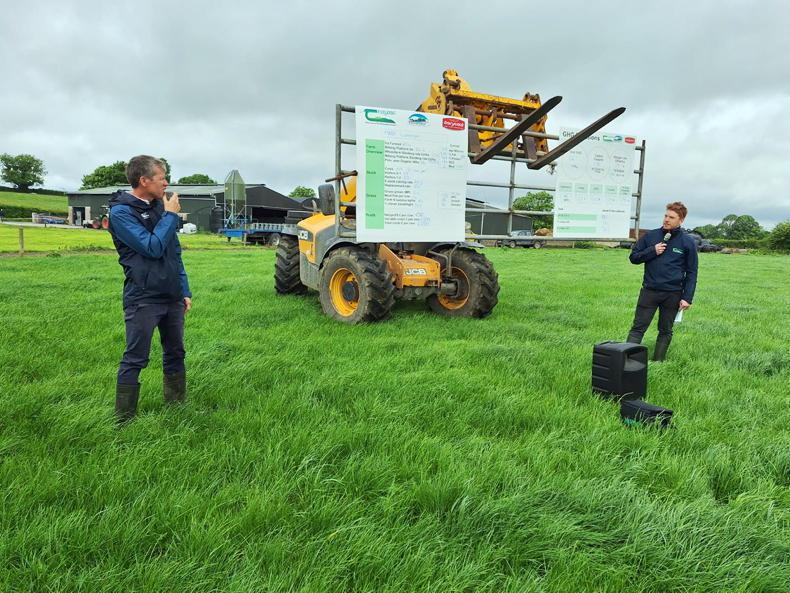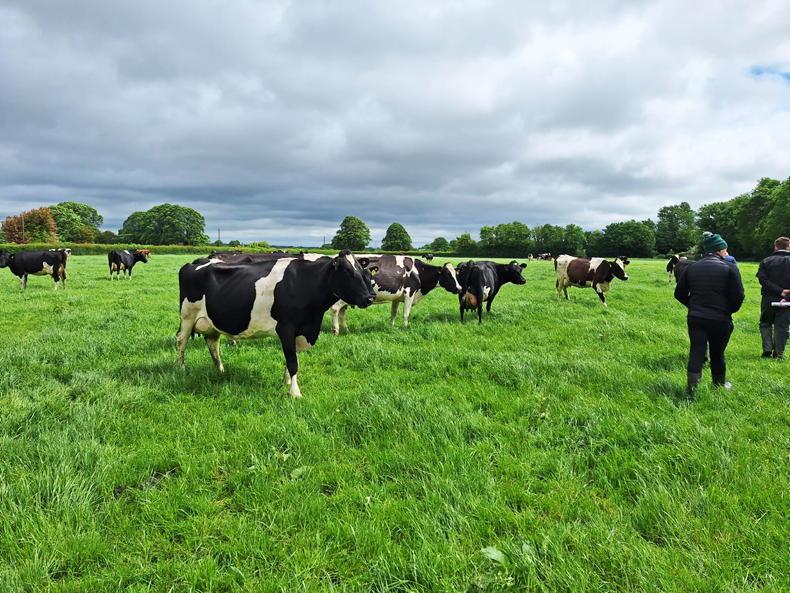The Dairygold/ Teagasc joint signpost programme held a walk on 29 May on the farm of Mark Lonergan of Rosegreen, Co Tipperary. Mark has been part of the joint programme since 2018 and it comes to an end this year. The programme has set the farm up to achieve excellent success over the past seven years and into the future. Discussion on the day centred around farm performance, breeding, the challenges of clover and progress of the farm over the term of the programme.
Mark is currently milking 107 cows across a total farm area of 60ha. The farm once carried closer to 130 cows on less ground but the increased frequency of droughts and silage shortages forced the farm to drop the numbers, resulting in a more manageable system with less reliance on inputs. According to Mark: “Sometimes fewer cows can make you more money, when things are done right.”

Mark Lonergan and Darragh Kelly at the walk in Cashel.
Over recent years the focus has been on maximising the genetics of his mainly black and white herd, boosting the fertility and solids of the herd, while maintaining yield around 6,300 litres/cow. The farm is consistently producing around 550kg of milk solids with concentrate input varying from 800kg-1,300kg/cow depending on how severe the summer drought conditions are year to year.
Cows were finished the first round of breeding early this week, with submission rates well over 90%. Heifers are fixed time artificially inseminated and served on the 8 May. Mark is delighted with his fixed time programme on heifers, stating that “he would never go back”. All animals are served in the first three weeks with dairy semen, and beef AI used from then on.
Fergal O’ Mahony spoke on how genetics paired with good management has allowed the farm to achieve a cumulative value of €165,000 above the co-op average over the seven years of the programme.

Cows on the farm of Mark Lonergan, Cashel, Co Tipperary.
Grass production on farm averages around the 13-tonne mark. Clover is incorporated in all reseeds and has done well on the farm. Mark is currently walking the farm every four or five days to keep on top of growth rates with the recent rain. Nitrogen application will be reduced in all fields with good clover in the coming rotation. Stuart Childs of Teagasc, discussed how “clover is the equivalent to a second half player” and how “it really starts to kick in now from June on”.
The day finished up with a “thank you” to all those involved from Joe Tobin of Dairygold. He a special mention to both Mark Lonergan, Noreen O’ Donovan (joint programme advisor) and Darragh Kelly (local Teagasc advisor). There will be more on today’s walk in the coming weeks in the Irish Farmers Journal.
The Dairygold/ Teagasc joint signpost programme held a walk on 29 May on the farm of Mark Lonergan of Rosegreen, Co Tipperary. Mark has been part of the joint programme since 2018 and it comes to an end this year. The programme has set the farm up to achieve excellent success over the past seven years and into the future. Discussion on the day centred around farm performance, breeding, the challenges of clover and progress of the farm over the term of the programme.
Mark is currently milking 107 cows across a total farm area of 60ha. The farm once carried closer to 130 cows on less ground but the increased frequency of droughts and silage shortages forced the farm to drop the numbers, resulting in a more manageable system with less reliance on inputs. According to Mark: “Sometimes fewer cows can make you more money, when things are done right.”

Mark Lonergan and Darragh Kelly at the walk in Cashel.
Over recent years the focus has been on maximising the genetics of his mainly black and white herd, boosting the fertility and solids of the herd, while maintaining yield around 6,300 litres/cow. The farm is consistently producing around 550kg of milk solids with concentrate input varying from 800kg-1,300kg/cow depending on how severe the summer drought conditions are year to year.
Cows were finished the first round of breeding early this week, with submission rates well over 90%. Heifers are fixed time artificially inseminated and served on the 8 May. Mark is delighted with his fixed time programme on heifers, stating that “he would never go back”. All animals are served in the first three weeks with dairy semen, and beef AI used from then on.
Fergal O’ Mahony spoke on how genetics paired with good management has allowed the farm to achieve a cumulative value of €165,000 above the co-op average over the seven years of the programme.

Cows on the farm of Mark Lonergan, Cashel, Co Tipperary.
Grass production on farm averages around the 13-tonne mark. Clover is incorporated in all reseeds and has done well on the farm. Mark is currently walking the farm every four or five days to keep on top of growth rates with the recent rain. Nitrogen application will be reduced in all fields with good clover in the coming rotation. Stuart Childs of Teagasc, discussed how “clover is the equivalent to a second half player” and how “it really starts to kick in now from June on”.
The day finished up with a “thank you” to all those involved from Joe Tobin of Dairygold. He a special mention to both Mark Lonergan, Noreen O’ Donovan (joint programme advisor) and Darragh Kelly (local Teagasc advisor). There will be more on today’s walk in the coming weeks in the Irish Farmers Journal.








 This is a subscriber-only article
This is a subscriber-only article










SHARING OPTIONS: